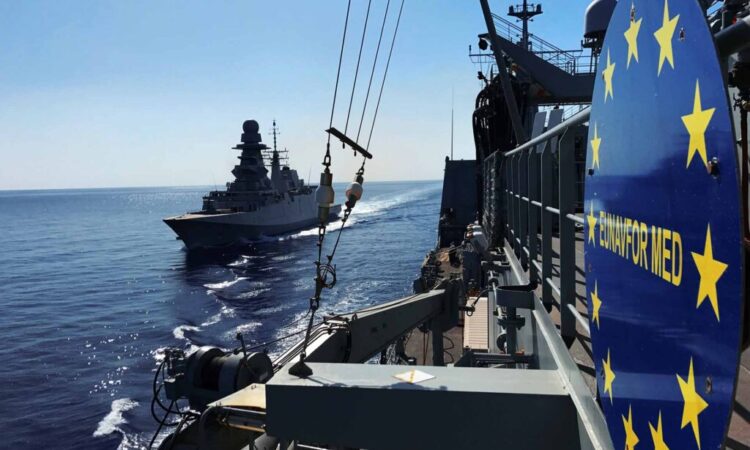
In its monthly report, the European naval operation IRINI has announced that it monitored 25 suspect flights out of 1,131 flights to Libya during February, explaining that it carried out 9 visits on ships with Master’s consent out of 434, and investigated 271 merchant vessels via radio calls out of 8,647, according to the European External Action Service (EEAS).
IRINI continued to monitor 25 airports (and landing strips) and 16 ports (and oil terminals). Through the Crime Information Cell, the Operation issued one (out of 78) recommendations of inspection of a suspect vessel in EU Member States’ ports, EEAS said in a statement.
After the 1st Berlin Conference, the Council of the European Union decided to launch, on 31 March 2020, a new military operation called EUNAVOR MED IRINI and focused on implementing the UN arms embargo on Libya, EEAS pointed out.
“IRINI is part of the European integrated approach to Libya, which includes political, military, economic and humanitarian efforts to bring stability and security to the country.”
The tasks of Operation EUNAVFOR MED IRINI are to counter illegal arms trafficking, supporting the implementation of the arms embargo on Libya based on the relevant UN Security Council Resolutions (core task), to gather information on oil smuggling, in particular due to its consequences on the Libyan economy and its possible use to finance the arms market, to contribute to the disruption of the migrant smuggling business model by collecting information with aerial assets and sharing it with FRONTEX (The European Border and Coast Guard Agency) and relevant national authorities, to support the development of Libyan Coast Guard and Navy’s Search and Rescue capacity through training. This task is yet to be implemented, as stated by EEAS.
“Since its launch, Operation EUNAVFOR MED IRINI has boarded and inspected 25 suspect vessels. On three occasions, IRINI seized the cargos assessed to be in violation of the UN arms embargo and diverted the vessels to a port of an EU Member State. One flag State (Turkey) has denied the consent to board and inspect suspect vessels on nine occasions.”
Operation IRINI has also investigated 8 647 merchant vessels through request of information via radio calls (hailing) and visited 434 vessels upon their Masters’ consent (so-called ‘friendly approaches’*.)
Furthermore, the Operation has investigated, 1 131 suspect flights, 25 airports and 16 ports and provided 41 special reports to the UN Panel of Expert on Libya. Most of these referred to violations or possible violations of the arms embargo and oil smuggling activities in the west and in the east of the country.
Through the embedded Crime Information Cell, the operation issued 78 recommendations for inspection of suspect vessels in EU Member States’ ports to the relevant Law Enforcement agencies, of which 60 were conducted.






